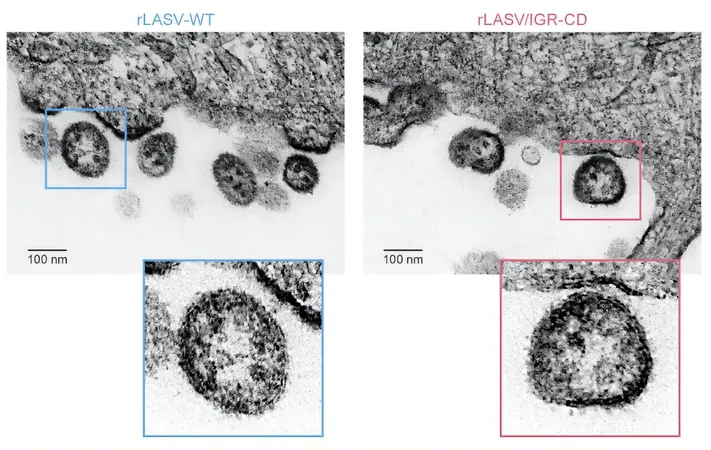
Breakthrough Vaccine Against the 'Unbreakable' Lassa Virus Achieves 100% Success Rate!
2024-12-18
Author: Mei
In a groundbreaking development, a new live-attenuated vaccine targeting the notoriously dangerous Lassa virus has demonstrated remarkable protective results in guinea pigs, according to a study published by researchers from the Texas Biomedical Research Institute, The Scripps Research Institute, and the National Institute of Allergy and Infectious Diseases (NIAID) in npj Vaccines.
Lassa virus, responsible for the deadly Lassa fever, claims tens to hundreds of thousands of lives annually and currently has no approved vaccine or cure. Transmitted primarily from infected rodents to humans through contaminated food or surfaces, Lassa fever often manifests asymptomatically but can escalate into severe conditions, including fever, hemorrhaging, and organ failure within a fortnight of infection. The fatality rates hover between 15% and 20%, which makes it an urgent target for vaccine research—a sentiment echoed by the World Health Organization, emphasizing its high potential for causing public health emergencies.
Leading the charge, Texas Biomed Professor Luis Martínez-Sobrido, Ph.D., and Scripps Research Institute Professor Juan Carlos de la Torre, Ph.D., have tirelessly dedicated the last decade to developing this vaccine. They focused on crafting a live-attenuated vaccine—a method effective for other successful vaccines like those for measles, mumps, rubella, smallpox, chickenpox, and yellow fever.
Dr. Martínez-Sobrido explained the advantage of live-attenuated vaccines: "They can provide longer-lasting and broader protection because they train the immune system to recognize the complete virus rather than just fragments of it."
However, a critical aspect of creating a safe live-attenuated vaccine is ensuring that it cannot revert to its virulent form. This involves sophisticated genetic modifications to ensure that if someone were to be vaccinated and then infected by a wild strain of the virus, the immune defenses would still protect them from illness.
In their innovative approach, the researchers employed techniques such as codon deoptimization to modify the RNA in the virus, targeting a crucial protein that facilitates the virus's binding to human cells. Additionally, they made changes to the large segment of the virus's RNA, effectively constructing a modified virus that mimics its dangerous counterpart without the capacity to cause disease.
Dr. Martínez-Sobrido emphasized the unique strength of their method, calling it “unbreakable attenuation.” He noted, “By combining our two strategies, even if there were a recombination with a wild virus, the outcome would still be an attenuated virus incapable of causing harm.”
The results of the study were compelling, showcasing the attenuated virus’s excellent safety profile along with its substantial reduction in viral replication and emergence of virulence. In tests involving 50 guinea pigs, when exposed to lethal doses of the virus, those who received the vaccine experienced no adverse effects and remained completely healthy, achieving an astonishing 100% protection rate.
This promising breakthrough brings us one step closer to combating Lassa fever effectively, potentially paving the way for further advancements in the public health response to emerging infectious diseases. Scientists are hopeful that, with continued research and testing, a viable Lassa virus vaccine could soon move towards clinical trials, transforming the landscape of viral threat mitigation in affected regions.


 Brasil (PT)
Brasil (PT)
 Canada (EN)
Canada (EN)
 Chile (ES)
Chile (ES)
 España (ES)
España (ES)
 France (FR)
France (FR)
 Hong Kong (EN)
Hong Kong (EN)
 Italia (IT)
Italia (IT)
 日本 (JA)
日本 (JA)
 Magyarország (HU)
Magyarország (HU)
 Norge (NO)
Norge (NO)
 Polska (PL)
Polska (PL)
 Schweiz (DE)
Schweiz (DE)
 Singapore (EN)
Singapore (EN)
 Sverige (SV)
Sverige (SV)
 Suomi (FI)
Suomi (FI)
 Türkiye (TR)
Türkiye (TR)